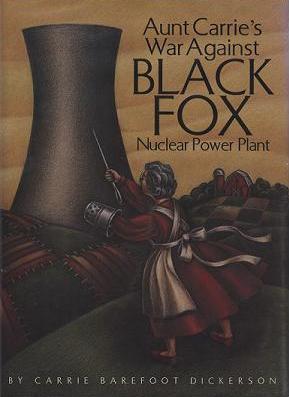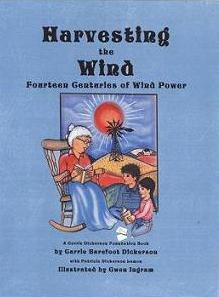
Citizens of Oklahoma and the world will forever be indebted to Carrie Barefoot Dickerson for leading the efforts to make northeastern Oklahoma safer for future generations. In May 1973, Aunt Carrie, as she was known by her many supporters and friends, read a news article about Public Service of Oklahoma's plans to build the Black Fox Nuclear Power Plant near Inola, about 15 miles from Tulsa and a few miles from the Dickerson family farm.
Recalling reports she had read earlier of wildlife birth defects coincident with effluent from the WWII Manhattan Project, she researched the current efforts to build nuclear power facilities. What she learned frightened and concerned her so much that despite her lack of political and publicity experience, she held a news conference at which she announced the formation of the political action group Citizens' Action for Safe Energy (CASE).
Aunt Carrie and CASE, with co-chair Ilene Younghein of Oklahoma City, began an expensive but determined battle to educate the public and stop construction of the plant. Following her lead, other anti-nuclear organizations were formed in the area, and citizens from all walks of life and ethnic groups joined in the battle. After a nine-year struggle, PSO announced on Feb. 16, 1982, that they would not build the Black Fox facility. Black Fox was the only nuclear power plant to be cancelled by a combination of legal and citizen action after construction had started.
During those nine years, Carrie and her husband, Robert, had to mortgage the family farm and sell their nursing home to help pay the bills and legal fees resulting from the struggle. Less than a year before the PSO announcement, Robert died of complications from a stroke.
Robert's death just before the cancellation of the power plant left Carrie deeply in debt and without a reliable source of income. She and Robert believed that it was their duty, both as citizens and parents and as principled human beings, to make whatever sacrifices were necessary to protect the residents of northeastern Oklahoma and the world which would be endangered by the environmental side effects of uranium mining and processing.
In recent years, her only source of income, other than Social Security, had been her health food store in Claremore, which she had to close in 2002. Carrie Barefoot Dickerson, was born May 24, 1917, in Okmulgee, Okla. Her marriage to prize-winning Cherokee dairy farmer and fellow OSU graduate, Charles Robert Dickerson in 1938, lasted 43 years until Robert's death. She was the mother of four, grandmother of five, and great-grandmother of four. Her professional endeavors have included work as a teacher, nutritionist, home demonstration agent, craftswoman, master quilter and designer, nurse, nursing-home co-owner and -operator, political and environmental activist, public speaker and writer. Her writing became a major focus twice in her life after the defeat of the Black fox plant. She wrote "Aunt Carrie's War Against Black Fox Nuclear Power Plant" in 1995 with the assistance of her daughter, Patricia Lemon, recording the story of her battle to prevent Public Service Co. of Oklahoma from building at Inola, OK.
For many years, Carrie's youngest daughter Mary cared for her and helped her with her research. She was actively informing herself and others about alternative forms of energy, especially geo-thermal and wind energy. She had begun to bring her idea for a book about the history of wind power for young readers to life and was working with her daughter Patricia again. She also enlisted the help of Drumright, OK artist Gwen Ingram to illustrate the history of windmills throughout the world over the last fourteen centuries. Mary's unexpected death in 2005 cast a shadow over Carrie, but did not stop her from persevering on her project. She had a preliminary edit finished and printed in early 2006, and after much reading and discussion, had worked tirelessly to finish the book. She finished her final edit on Nov. 16 and died quietly in her sleep early the next morning. As her friends said, death could only overtake her while sleeping. She was too busy the rest of the time!
Long-time area resident, teacher, businesswoman, and anti-nuclear activist Carrie Barefoot Dickerson died peacefully in her sleep early on the morning of Thursday, November 17, 2006 at the age of 89. Well-known for her determination and her ability to bring together disparate groups, she lived the principles of American democracy that her generation defended during World War II.
 Barefoot Dickerson, born May 24, 1917 to a pioneer family in Okmulgee County, attended the Rocky Hill and Nuyaka Mission schools there before beginning undergraduate studies in home economics education with emphasis on nutrition at Oklahoma State University, where she also earned an M.S. degree.
Through their prize-winning 4-H work, she met her late husband, C.R. Dickerson, later an award-winning dairyman and veteran's agriculture teacher, on an Oklahoma Farmers' Union-sponsored trip to Washington, D.C. in 1936. They married in 1938, as undergraduates, and made their home on the Dickerson Farm east of Claremore.
Barefoot Dickerson, born May 24, 1917 to a pioneer family in Okmulgee County, attended the Rocky Hill and Nuyaka Mission schools there before beginning undergraduate studies in home economics education with emphasis on nutrition at Oklahoma State University, where she also earned an M.S. degree.
Through their prize-winning 4-H work, she met her late husband, C.R. Dickerson, later an award-winning dairyman and veteran's agriculture teacher, on an Oklahoma Farmers' Union-sponsored trip to Washington, D.C. in 1936. They married in 1938, as undergraduates, and made their home on the Dickerson Farm east of Claremore.
Barefoot Dickerson began her teaching career in 1943 at the German-speaking Mennonite Pleasant View community school east of Inola. She went on to teach in several Rogers and Mayes County schools and served as a home demonstration agent in the Cherokee communities of Muskogee and as a 4-H Club leader.
About 1957, she resigned as home economics teacher at Claremore High School to begin a bakery offering whole-grain organic breads to customers all over northeastern Oklahoma.
In 1964, she and her late husband founded Aunt Carrie's Nursing Home (later Wood Manor) in Claremore, where they, their late daughter, Mary, and their dedicated staff provided the loving care and nutritious meals that frail community elders needed for physical and mental health. At the age of 50, she began studying nursing at St. John's Hospital in Tulsa to fill a need at the nursing home. Then one day in 1973, Public Service Company of Oklahoma (PSO) announced plans to build Black Fox nuclear-power plant near Inola. Then began the environmental work that pervaded the remaining four and a half decades of her life. Finally in 1981, an anticipated Corporation Commission decision prompted by the work of CASE (Citizens' Action for Safe Energy), the organization she founded to teach the public about the dangers posed by nuclear power, led to PSO's cancellation of the project. During the nine years of hearings, she became a master quilter, designing and creating works to occupy her fingers while she listened and that she could use to help raise money for legal fees once they consumed the proceeds from selling the nursing home. After Black Fox was cancelled, she supported herself by teaching quilting and with a health-foods store she and her daughter Mary operated.
Barefoot Dickerson is survived by three sisters, her twin, Clara Barefoot-Sehorn of Olympia, Washington, Florence Gaskill Cahalen of Broken Arrow, Paula Bentley of Barada Hills, Nebraska, a brother, Marvin Barefoot III of Davis, California, two daughters, Florence Dickerson Snelling of Claremore and Patricia Dickerson Lemon of Justus and Warwick, Massachusetts, five grandchildren, Signe Lemon Friedrichs of Herndon, Virginia, Sandra Snelling Patterson of Justus, Ted Lemon of Tucson, Arizona, Melissa Dickerson of Verdigris, and J.J. Dickerson of Justus, four great-grandchildren, and numerous nieces and nephews.
Two children, J.R. Dickerson II and Mary Dickerson, and her husband preceded her in death. Preceding her death, Barefoot Dickerson had been in good health and spirits, having received excellent physical therapy and care at Wood Manor Nursing Home in Claremore, where she had recently completed, under the auspices of the not-for-profit Carrie Dickerson Foundation, a children's history of wind power in collaboration with Drumright artist Gwen Ingram and her daughter Patricia.

Follow us on Facebook ![]() • Follow us on Twitter • Follow us on Instagram
• Follow us on Twitter • Follow us on Instagram